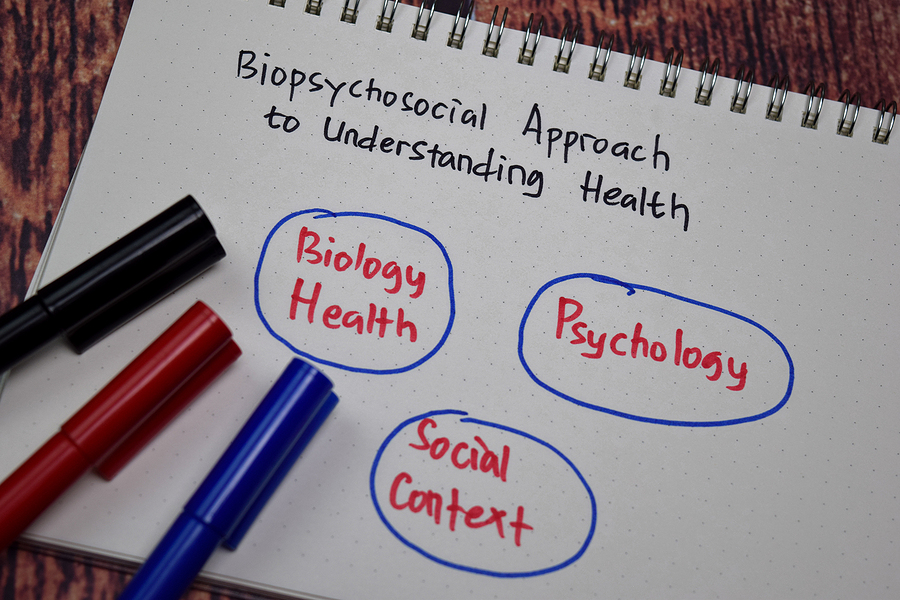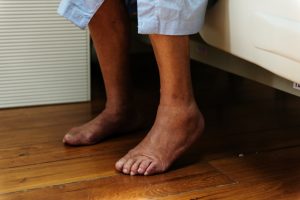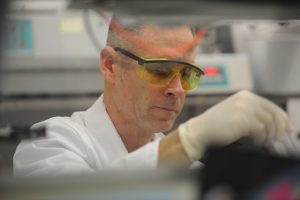
The biopsychosocial model is a health analysis and treatment method focusing on the biological, mental, and societal impacts shaping an individual’s health and well-being. This model views health as a consequence of connections between lifestyle, physiology, and psychological cycles. It emphasizes the collaborations between these variables and less on the individual factors.
Family Nurse Practitioners (FNPs) utilize a biopsychosocial procedure when assessing health, allowing for a more exhaustive patient assessment. This approach looks more holistically at the patient’s health and allows FNPs to explore the physical, emotional, social, family, and environmental factors that may affect a patient’s health. FNPs can also give patients instructions and assets to help support any issues in the assessment.
The biopsychosocial model has been articulated as an approach to clinical care and a framework for clinical implementation. It is proposed that various elements affect a patient’s experience of physical agony, sickness, or illness, extending to biological components such as tissues, molecules, structures, and environmental factors of the social and mental order.
These elements affect patients subjective experience, treatment results, and successful treatment as they advance through their medical journey. This treatment strategy considers the physical, psychological, and social aspects of sickness or injury and strives for an incorporated approach to care. This subject has gotten much consideration and has been widely studied recently.
It is evident, particularly in prolonged pain, that attributing the issue to “arthritis” alone cannot precisely clarify the individual’s condition.
It would be wrong to accept that patients with debilitating pain are simply “making it up” or that their condition is “all in their head,” even if their physical and biomechanical issues cannot explain it. Concentrating exclusively on joint degeneration to clarify a patient’s anguish or agony fails to consider those without physical or biomechanical problems.
Models of healthcare are vital to the methods used in a clinical setting. Particularly, when medical professionals perform essential assessments, the questions and format of the assessment is based on the model used. Here are some ways the biopsychosocial’ model impacts health assessments by FNPs.
Establishing healthy relationships
Establishing healthy relationships is essential to the FNPs’ duties in the biopsychosocial model, as it helps them to assess emotional and psychological stipulations and the integral mechanisms of particular physical illnesses.
Strong relationships also permit FNPs to develop a trusting bond with the patient, which could result in more exact self-reporting of health data. Furthermore, by assisting patients in building robust relationships, the nurse practitioner can offer additional help and advice that could eventually add to a patient’s overall wellness.
This could include aiding patients in discovering therapy services or reinforcement groups or connecting them with community resources. A more in-depth understanding of a patient’s social, psychological, and emotional biography permits family nurse practitioners to make wise decisions concerning the patient’s health and provide better treatment plans.
Taking a comprehensive approach
The biopsychosocial model is a comprehensive approach to healthcare that recognizes the necessity of physical, psychological, and social elements in patient health. As an authorized family nurse practitioner, you must employ this model to assess patients and extract the most efficient treatment approaches.
To accomplish this, consider the biological, cognitive, and social influences that could impact a patient’s health. Your assessment must go beyond a physical exam, blood tests, and other medical checks.
You must also evaluate the patient’s life circumstances, emotional status, and accessible resources. This approach can lend a hand to you in singling out fundamental issues linked to physical or mental health that could add to a patient’s all-inclusive well-being or absence thereof. Once identified, FNPs can offer essential care and resources to ensure a positive health outcome.
Exploring behavioral elements
By exploring behavioral elements, such as diet and exercise, as part of assessing a patient’s health, Family Nurse Practitioners (FNPs) can acknowledge and devise strategies that may improve overall outcomes.
An FNP evaluates the ‘whole person.’ For instance, consider that an FNP notices a patient has unhealthy dietary habits. In that situation, they can proffer choices for better eating and extend resources to help the patient find healthier food selections.
They can as well refer the patient to counseling or other professionals if they feel it is necessary. Furthermore, by evaluating the patient’s access and capacity to get to medical appointments, the FNP can help the patient oversee any transportation matters they may have.
Establishing adaptation strategies
Establishing adaptation tactics for the biopsychosocial model to set health assessments by FNPs is a method for them to grasp the worth of addressing the interconnection among biological, psychological, and social variables of a patient’s health.
FNPs should deploy techniques such as counseling to tackle psychological issues and advise social service agencies to confront social problems when appraising a patient’s health.
These strategies let FNPs take into consideration the patient’s physical, psychological, and social well-being and how the distinctive elements may influence each other. This technique of looking at things permits FNPs to give an extensive, comprehensive patient assessment and better oversee the patient’s health.
Examining deeply
In health assessments administered by FNPs, this approach contemplates a patient’s primary biological, intellectual, and social issues impacting their well-being. By delving deeper into the patient’s physical, psychological, and social environment, an FNP can more accurately diagnose and address their situation.
This thorough healthcare method assures that all patient life elements have been acknowledged. It allows the FNP to spot any hidden aspects influencing their health and supply them with the most effective care.
For you to gain the skills to examine deeply, American International College online fnp program will help you gain experience addressing such topics as the art and science of advanced nursing. The program includes coursework in research, assessment, advanced concepts of pathophysiology and pharmacology, and more.
The biopsychosocial model provides FNPs with an essential holistic health evaluation and treatment architecture. By visualizing the person from a multidimensional point of view, FNPs can better recognize the numerous elements affecting health results.
With this understanding, FNPs can assess physical and psychological wellness concerns and devise personalized treatment plans to decrease vulnerabilities. This model stresses the dynamic and interactive essence of health’s physical, psychological, and social features and underlines collaboration among providers and patients.
Knowing how to employ these principles is critical for FNPs to offer inclusive, customized care that encompasses all physical, mental, and social health aspects.
John Davis is a seasoned health journalist with expertise in public health and medical research. Holding a degree in health sciences, John excels in making complex health topics understandable and engaging for his readers. His articles, featured in top health publications, cover everything from cutting-edge treatments to public health policies. Outside of journalism, John is an advocate for health education and frequently speaks at community events.





